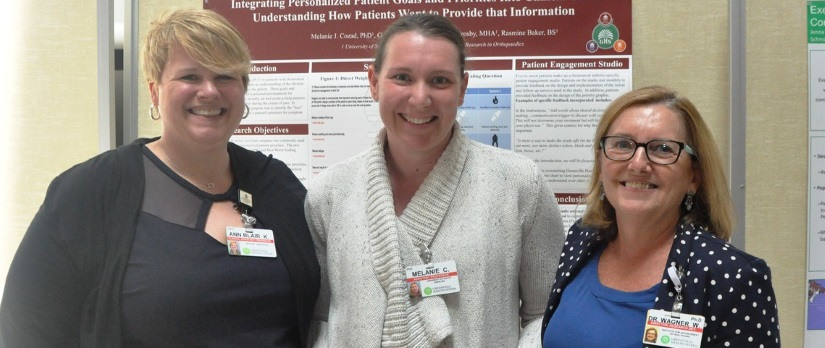September 18, 2018 | Erin Bluvas, [email protected]
Based at the Arnold School’s satellite campus in Greenville, Melanie Cozad is an assistant professor with the department of health services policy and management (HSPM) and the South Carolina SmartState Center for Effectiveness Research in Orthopaedics (CERortho). Earlier this year, she and her research team won two awards (best poster for patient engagement research and runner-up for best overall research poster) at the 2018 Greenville Health System Research Showcase. The posters were connected to their research on patient decision-making, which is funded by a grant Cozad received from Pfizer in 2017.
Working closely with HSPM graduate student Kaitlyn Crosby, research assistant Rasmine Baker, and GHS clinical rheumatologist and co-investigator Gulzar Merchant, Cozad has been developing a tool that integrates personalized patient-specific preferences into clinical care using the Pfizer $289K grant. The tool measures each patient’s lifestyle goals and priorities (e.g., pain reduction, mobility, fatigue management) and creates a graphic that the patient receives. The graphic is designed to help the patients express what matters to them during the office visit. This type of interaction between patient and provider is a critical component of patient-centered care.
A lot of providers believe they understand a patient’s goals and priorities, but patients don’t always leave the visit feeling the same way. So we’re developing a way to apply economics to help patients communicate more effectively with their providers.
-Melanie Cozad, HSPM assistant professor
Just a year into the project, the team’s progress was recognized during the recent GHS event. The runner up for best overall research award reflects the focus of the research, which is to create a tool that empowers patients to identify their individualized priorities and express them during an office visit. The best poster for patient engagement research award demonstrates their commitment to continuously incorporating patient feedback through the development of the tool. Several rheumatoid arthritis patients met with Cozad monthly to receive updates on the research project and to assist with designing and piloting the tool as well as interpreting the results.
“These patients acted more as co-investigators rather than subjects of research,” says Cozad. “This mentality of including patients as partners in the research process, which is fostered by the Patient Centered Outcomes Research Institute, is quite new, but the Greenville Health System has supported these types of initiatives.”
Cozad’s interest in patient-centered care stems from her background as an economist. She earned master’s and doctoral degrees in the field, with concentrations in health, from the University of Tennessee before accepting the Robert E. Hughes Endowed Professorship at Furman University. She joined the Arnold School in 2015.
“As an economist, part of our training surrounds the idea of being able to measure preferences or priorities,” says Cozad, whose graduate work focused on accessing societal preferences for valuing environmental goods (e.g., clean air, water). “One reason I was drawn to my job with the Arnold School was that everyone has certain preferences or priorities even when it comes to their healthcare, but often patients don’t realize how important their preferences are or how much they matter.”
According to Cozad, the advancement of healthcare has led to the availability of multiple treatments that might work for a patient with rheumatoid arthritis, but each treatment has benefits and drawbacks.
“In those instances, what matters to the patient needs to be discussed as the patient and their provider arrive at a treatment decision,” explains Cozad, who notes that patients often do not adhere to treatments that do not fit with their lifestyles. “The more I read about it, the more the idea of putting the patient at the forefront and empowering them to say, this is what matters to me—in other words, these are my priorities—made sense as a solution.”
The Pfizer grant’s call for proposals, which focused on the same problem, offered a perfect avenue for exploring such a solution. The challenge for Cozad’s team is to find a way to capture information about priorities—which vary widely and can be difficult to express—during a short office visit and create a tool that patients and providers feel comfortable using.
“A lot of providers believe they understand a patient’s goals and priorities, but patients don’t always leave the visit feeling the same way,” says Cozad “So we’re developing a way to apply economics to help patients communicate more effectively with their providers.”
Related:
